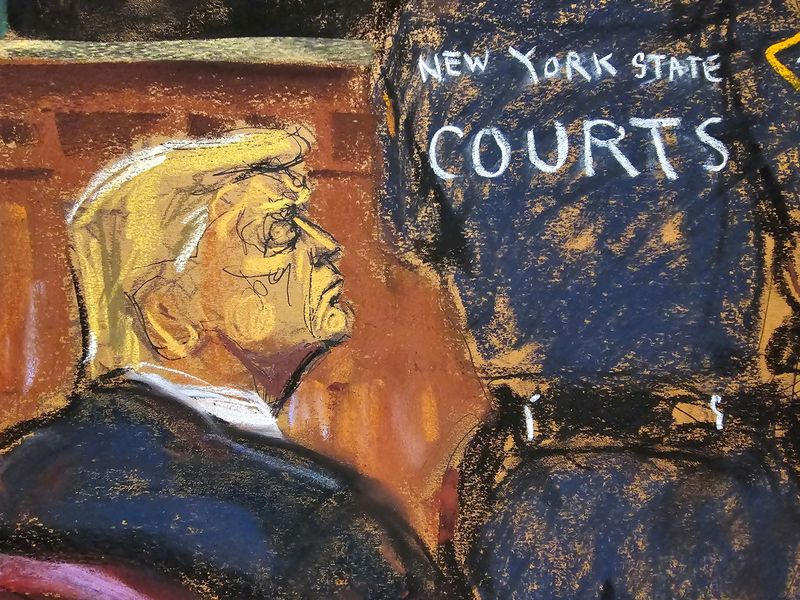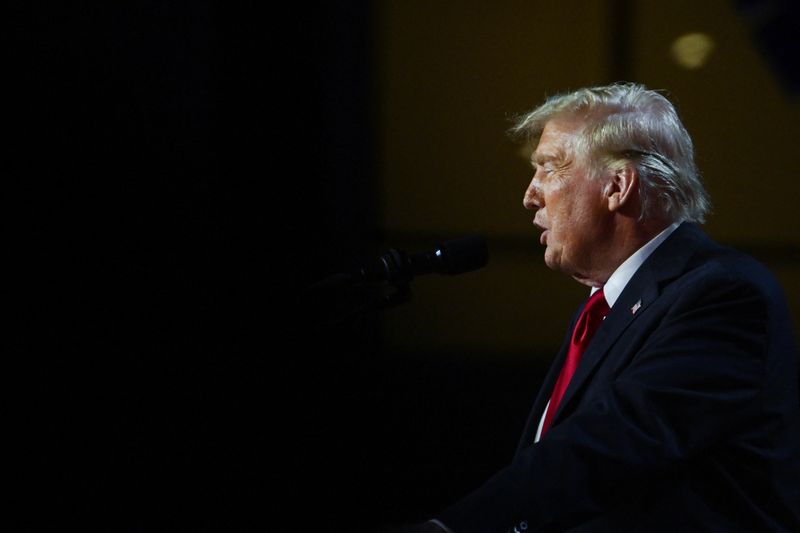By Andrew Goudsward, Luc Cohen, Sarah N. Lynch
WASHINGTON (Reuters) -Donald Trump's U.S. presidential election victory on Wednesday will essentially end the criminal cases brought against him, at least for the four years he occupies the White House.
The first former U.S. president to face criminal charges, Trump for much of this year faced four simultaneous prosecutions, over allegations ranging from his attempt to cover up a hush money payment to porn star Stormy Daniels during his 2016 campaign to his attempts to overturn his 2020 election defeat.
U.S. Justice Department officials on Wednesday were assessing how to wind down Special Counsel Jack Smith's two criminal cases against the Republican president-elect, due to a long-standing policy that forbids prosecuting a sitting president, a person familiar with the matter told Reuters.
A New York jury in May found him guilty of falsifying business records tied to the Daniels payment, making him the first former U.S. president convicted of a felony.
Trump told an interviewer on Oct. 24 that he would fire Smith -- who led the federal prosecutions over his attempts to overturn his election defeat and retention of classified documents after leaving office -- "within two seconds" of being sworn in.
Trump pleaded not guilty to all charges and cast the prosecutions as politically motivated.
"The American people have heard these Democrat prosecutors' cases against President Trump and they're still going to elect him anyway," said Mike Davis, the founder of the Article III Project, a conservative legal advocacy group.
Trump will not have the same control over the New York hush money case or Georgia's prosecution of him for trying to overturn his 2020 loss in that state. But his unique role as president makes it unlikely he will face legal consequences in either case during his term in office.
"He was properly charged with crimes within the system we have," said Kristy Parker, a special counsel at Protect Democracy, an advocacy organization dedicated to countering what it calls authoritarian threats to the U.S. Parker said if Trump does shut down the cases, "that won't mean it was the right thing."
One more court date is scheduled before he is due to be sworn in on Jan. 20, though legal experts said that was unlikely to go forward.
NEW YORK HUSH MONEY CASE
In New York, Trump’s lawyers are expected to ask Justice Juan Merchan to delay his sentencing currently scheduled for Nov. 26 - at which he could face up to four years in prison. Sentencing a president-elect ahead of Inauguration Day would be unprecedented in U.S. history, and legal experts expect the hearing to be delayed.
Merchan has already twice postponed Trump's sentencing, which was initially scheduled for July 11, in part due to a July U.S. Supreme Court ruling finding that presidents have broad immunity from prosecution over their official acts. Trump argues the case should be dismissed based on the ruling, which prosecutors dispute.
Trump has vowed to appeal his conviction once he is sentenced. Separately, his lawyers have asked the 2nd U.S. Circuit Court of Appeals to move the case to federal court. Such a move, if successful, could create new legal obstacles for the case.
FEDERAL PROSECUTIONS
Trump faces four charges in federal court in Washington accusing him of spreading false claims of election fraud to try to block the collection and certification of votes following the 2020 election, which Trump lost to Democrat Joe Biden.
Smith had also charged Trump with unlawfully holding onto classified documents after his first term ended in 2021 and obstructing efforts by the U.S. government to retrieve the records.
Florida-based U.S. District Judge Aileen Cannon, who was nominated to the bench by Trump, dismissed all charges in July after finding that Smith was improperly appointed to the role and did not have the authority to bring the case.
The Justice Department filed an appeal in the case.
James Trusty, who previously represented Trump in both matters, said he was not as optimistic that the Justice Department would dismiss the cases on its own.
“My instinct is they would rather sit in status quo or largely status quo, rather than affirmatively pull the plug," he said.
"Politically, I think they would rather have the new Trump administration’s fingerprints on the demise of the cases.”
GEORGIA RACKETEERING CASE
Prosecutors in Fulton County, Georgia, last year used state racketeering laws -- developed to fight organized crime -- to charge Trump in an alleged conspiracy to reverse his defeat in the battleground state in the 2020 election.
Trump will not be able to end the prosecution, but his lawyer has already said in court he will seek to pause any activity related to Trump based on an argument that a president should not face the burden of a criminal prosecution while in office.

Trump and eight of his 14 co-defendants in the case are asking a Georgia appeals court to disqualify the lead prosecutor, Fulton County District Attorney Fani Willis, over alleged misconduct stemming from a romantic relationship she had with a former deputy. Oral arguments are scheduled for Dec. 5.
If that effort fails, the case will be able to proceed against the other co-defendants, who include Trump’s former personal lawyer Rudy Giuliani and White House chief of staff Mark Meadows. But legal experts expect that the case against Trump will not progress while he remains in the White House.
